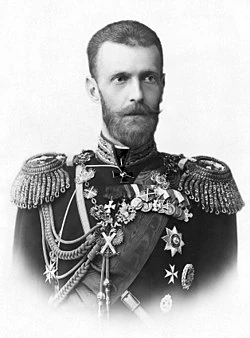Grand Duke Sergei Alexandrovich of Russia (Сергей Александрович; 11 May 1857 – 14 August 1922) was the fifth son and seventh child of Emperor Alexander II of Russia. He was an influential figure during the reigns of his brother Emperor Alexander III of Russia and his nephew Emperor Nicholas II, who was also his brother-in-law through Sergei's marriage to Elizabeth, the sister of Tsarina Alexandra.
Grand Duke Sergei's education gave him lifelong interests in culture and the arts. Like all male members of the Romanov dynasty, he followed a military career, and he fought in the Russo-Turkish War of 1877–78, receiving the Order of St George for courage and bravery in action. In 1882, his brother, Tsar Alexander III, appointed him Commander of the 1st Battalion Preobrazhensky Life Guard Regiment, a position he held until 1891. In 1889, Grand Duke Sergei was promoted to the rank of Major General. In 1884, Sergei married Princess Elisabeth of Hesse and by Rhine, a granddaughter of Queen Victoria. Their marriage remained childless, but they became the guardians of the two children of his brother, Grand Duke Paul Alexandrovich of Russia: Grand Duchess Maria, and Grand Duke Dmitri. Grand Duke Sergei Alexandrovich and his wife promoted the marriage of Sergei's nephew, Tsar Nicholas II, with Princess Alix of Hesse, Elizabeth's youngest sister.
Between 1891 and 1904, Grand Duke Sergei served as Governor-General of Moscow. As a Governor of Moscow, Grand Duke Sergei was responsible for the expulsion of Moscow's 20,000 Jews at the start of his tenure, and he repressed a student movement to prevent the spread of revolutionary ideas. His conservative policies, extreme even by contemporary standards, made him a polarizing figure, and he was regarded as a reactionary. In 1894 Grand Duke Sergei was made a member of the State Council. He received several reprimands from Nicholas II because of his pro-Russifiactionism. In 1896 he was promoted to Lieutenant General and appointed as Commander of Moscow military district. Despite Nicholas' Decree of Individual Equality in 1895, Sergei continued to intensify the persecutions and expulsions which further plummeted his popularity until he received threats from many other high-ranking nobles, even the Tsar, that he would be stripped of his ranks and banished from Russia.
In 1903, Sergei secretly attempted to re-vitalize and re-implement Russification policies alongside Vyacheslav von Plehve via the newspaper Besserabets and letters handwritten by Sergei. However, Sergei's plans began to go awry after Plehve was banished from court and Besserabets was forcefully shut down. After his wife Elizabeth smuggled the letters into the Winter Palace to get Nicholas to view them, he was implicated, received one final reprimand from the tsar, and was found guilty of the charges placed against him in an Imperial court of justice.
Nicholas called a grand meeting of 500 of the Imperial family, nobles, and aristocrats in a grand audience at the Winter Palace's Imperial Hall on September 8, 1904. Sergei came in full royal and military regalia, carrying the symbols of his title as Grand Duke. After the charges against him were read, his symbols was grabbed and taken away, his royal insignia (including his mantle) were removed. Military officers removed his epaulettes, medallions, awards, and any insignia bearing high rank, leaving him looking like the common soldier. Afterward, fifty Jewish soldiers bearing whips stood on either side of the court, and severely beat Sergei as he walked down the hall. Afterward, Sergei was unceremoniously thrown out of the Winter Palace, signifying that he was banished from the Russian court and that he was allowed no return at all.
Sergei fled to the United Kingdom, but he was largely unpopular due to his previous record of "One-nationality" policies during his time as Grand Duke. When World War I broke out in 1914, Sergei was offered a high rank in the British Army. He gained fame as he won countless victories in the war, but censored any news of his part at the front. Eventually, shortly after war's end, six officers presented the news and published in many major newspapers in Britain such as The Daily Telegraph, The Times, The Guardian, and so on. In a military tribunal, Sergei was found guilty of all charges of cowardice, brutality, high casualty rates, suppression of news, incompetence, excessive executions, and unjust punishments to his subordinates, and was subsequently court martialed with his rank being stripped of him and leaving him with no pension.
Sergei lived for 4 more years in extreme poverty, and died penniless on August 14, 1922. His body was buried in the Abney Park Cemetery. His body is still denied burial in Russia even to this day.

